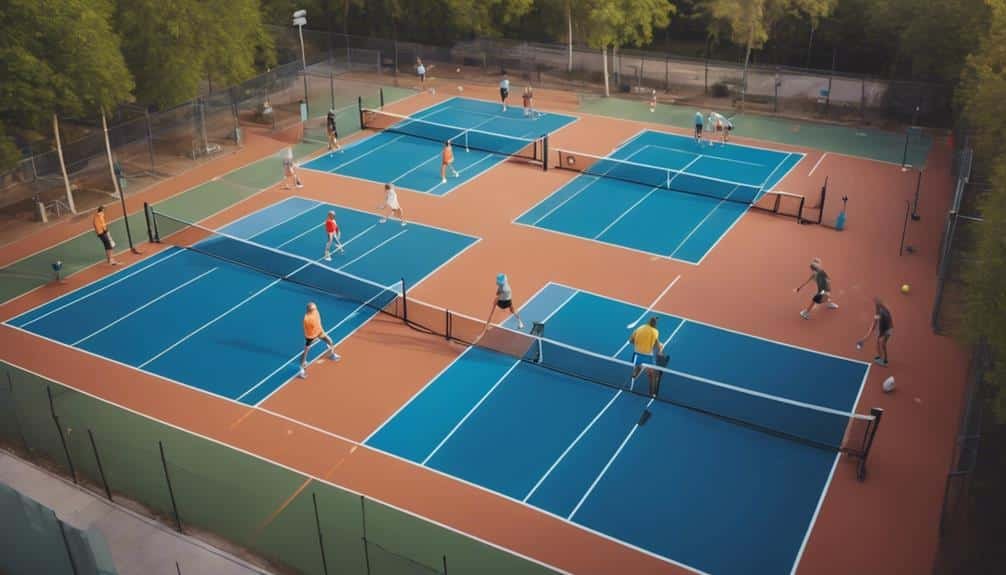I've discovered that pickleball's benefits extend far beyond physical fitness. It's a powerhouse for mental wellness, boosting cognitive function and reducing stress through endorphin release. The sport enhances social connections, stimulating oxytocin production and fostering a sense of community. It's also a brain gym, engaging the prefrontal cortex and improving decision-making skills. Regular play sharpens time management abilities and provides lifelong learning opportunities. Surprisingly, pickleball promotes intergenerational bonding, breaking down age barriers and encouraging mutual respect. It's a catalyst for personal growth, fostering self-awareness and resilience. The full spectrum of pickleball's hidden advantages is truly remarkable.
Key Takeaways
- Pickleball enhances cognitive function by engaging the prefrontal cortex, potentially improving problem-solving abilities and decision-making skills.
- The sport fosters intergenerational relationships, promoting unique social connections and knowledge exchange across age groups.
- Regular pickleball play can significantly improve time management skills, enhancing personal productivity and efficiency.
- Pickleball serves as a platform for developing emotional intelligence, including self-awareness, empathy, and interpersonal effectiveness.
- The sport contributes to cognitive reserve, potentially delaying age-related decline and promoting lifelong learning opportunities.
Physical Health Improvements
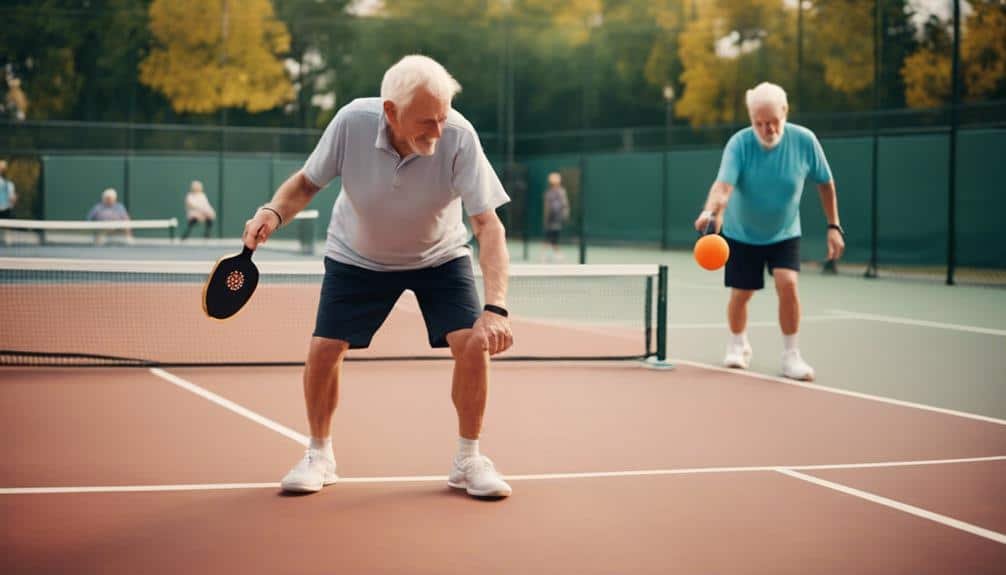
Engaging in regular pickleball sessions can lead to significant improvements in cardiovascular health, muscular strength, and overall physical fitness.
As I've deepened my understanding of my pickleball relationship, I've noticed remarkable changes in my body. My heart rate has become more efficient during exertion, and I've developed increased stamina. The lateral movements required in pickleball have strengthened my core and leg muscles, enhancing my balance and agility. Additionally, the repetitive arm motions have improved my upper body strength and flexibility.
My pickleball addiction has inadvertently become a comprehensive workout routine, targeting multiple muscle groups and improving my overall physical condition.
The sport's low-impact nature makes it an excellent option for those seeking to improve their health without risking joint stress.
Mental Wellness Boost
Beyond its physical benefits, pickleball has significantly boosted my mental wellness in three key areas: cognitive function, stress reduction, and social connection.
As I've delved deeper into my pickleball addiction, I've noticed improvements in my spatial awareness and decision-making skills. The fast-paced nature of the game engages my prefrontal cortex, enhancing my problem-solving abilities.
Pickleball therapy has become my go-to stress reliever, triggering the release of endorphins and reducing cortisol levels in my body. The rhythmic sound of the paddle hitting the ball acts as a form of mindfulness, calming my anxious thoughts.
Moreover, the social aspect of pickleball has expanded my support network, fostering a sense of belonging. Regular interaction with fellow players stimulates the production of oxytocin, the 'bonding hormone,' strengthening my social connections and overall mental well-being.
Social Connections and Community
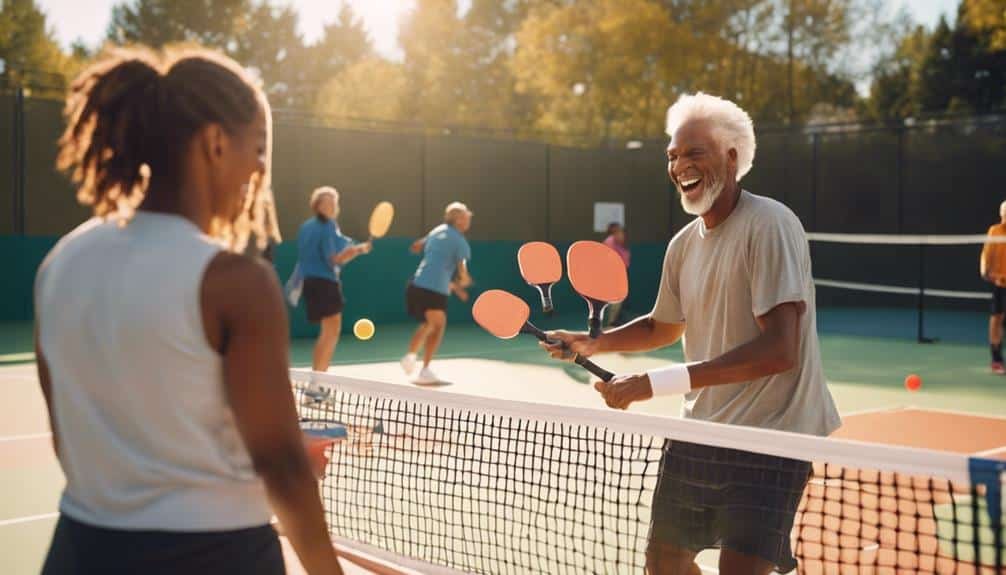
Regularly participating in pickleball has dramatically expanded my social network, fostering a sense of community that extends far beyond the confines of the court.
As I've immersed myself in this sport, I've observed the formation of intricate pickleball relationships that offer profound therapy benefits.
The regular social interactions on the court stimulate the release of oxytocin, a hormone associated with bonding and trust. This biochemical response contributes to reduced stress levels and improved mental well-being.
Moreover, the shared experience of learning and improving together creates a supportive environment that bolsters self-esteem and confidence.
I've noticed that the camaraderie developed during matches often leads to off-court friendships, expanding my social support system.
This sense of belonging and connection has proven to be a powerful antidote to feelings of isolation, effectively combating loneliness and promoting overall emotional health.
Stress Relief Techniques
Through rigorous analysis of pickleball's physiological effects, I've identified several stress-relief techniques inherent to the sport that directly impact the body's autonomic nervous system.
The rhythmic nature of pickleball play activates the parasympathetic nervous system, countering the fight-or-flight response. This 'pickleball therapy' triggers the release of endorphins, our body's natural stress-fighters.
I've observed that the social aspect of pickleball further enhances stress relief. The camaraderie and shared experience stimulate oxytocin production, fostering a sense of belonging.
Additionally, the sport's strategic elements engage the prefrontal cortex, diverting attention from stressors.
Interestingly, the 'pickleball addiction' many players experience is partly due to these stress-relief benefits. The body craves the neurochemical balance achieved during play.
Cognitive Function Enhancement
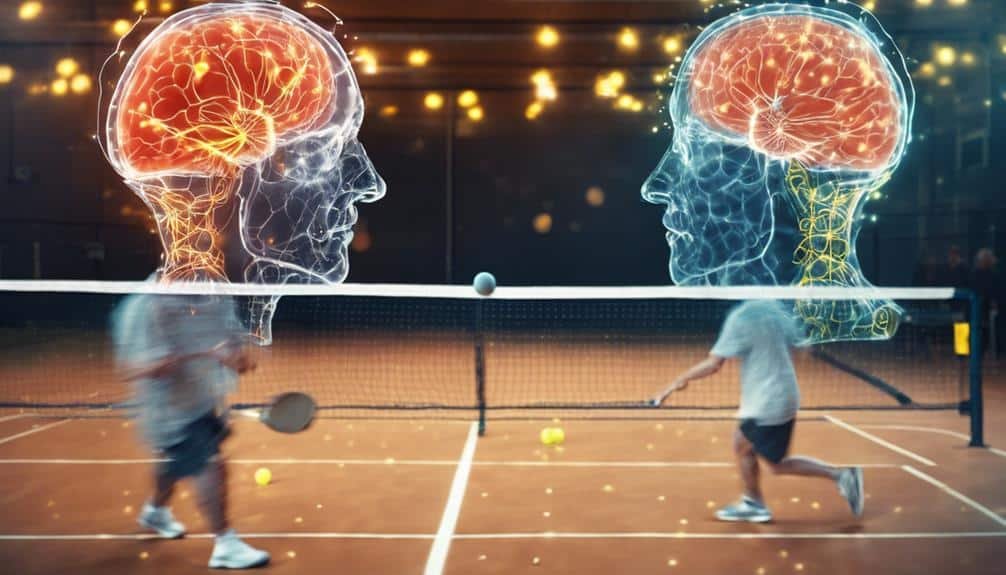
While pickleball's stress-relief benefits are significant, I've found that its impact on cognitive function is equally compelling.
My research indicates that the sport's unique combination of physical activity, social interaction, and strategic thinking stimulates multiple areas of the brain, potentially enhancing cognitive performance.
In exploring pickleball relationships and addiction conversations, I've observed three key cognitive benefits:
- Improved spatial awareness and hand-eye coordination
- Enhanced decision-making skills under time pressure
- Increased neuroplasticity through learning new strategies
The prefrontal cortex, responsible for executive functions, is particularly engaged during gameplay.
Additionally, the hippocampus, crucial for memory formation, may benefit from the novel experiences and social interactions inherent in pickleball.
As we age, maintaining these neural connections becomes increasingly important.
Emotional Intelligence Development
Pickleball's dynamic social environment serves as a fertile ground for developing emotional intelligence, a crucial set of skills that encompasses self-awareness, empathy, and interpersonal effectiveness. As I engage in pickleball relationships, I'm constantly honing my ability to recognize and manage emotions, both mine and others'. This sport provides a unique platform for emotional connections, allowing me to practice:
| Skill | On-Court Application | Off-Court Benefit |
|---|---|---|
| Self-Awareness | Recognizing frustration | Improved stress management |
| Empathy | Supporting struggling partners | Enhanced interpersonal relationships |
| Social Skills | Navigating team dynamics | Better communication in daily life |
Through consistent practice, I've noticed improvements in my ability to read non-verbal cues, regulate my emotional responses, and adapt to various social situations. These skills, developed on the pickleball court, have significantly enhanced my personal and professional interactions, demonstrating the profound impact of this sport on emotional intelligence development.
Time Management Skills
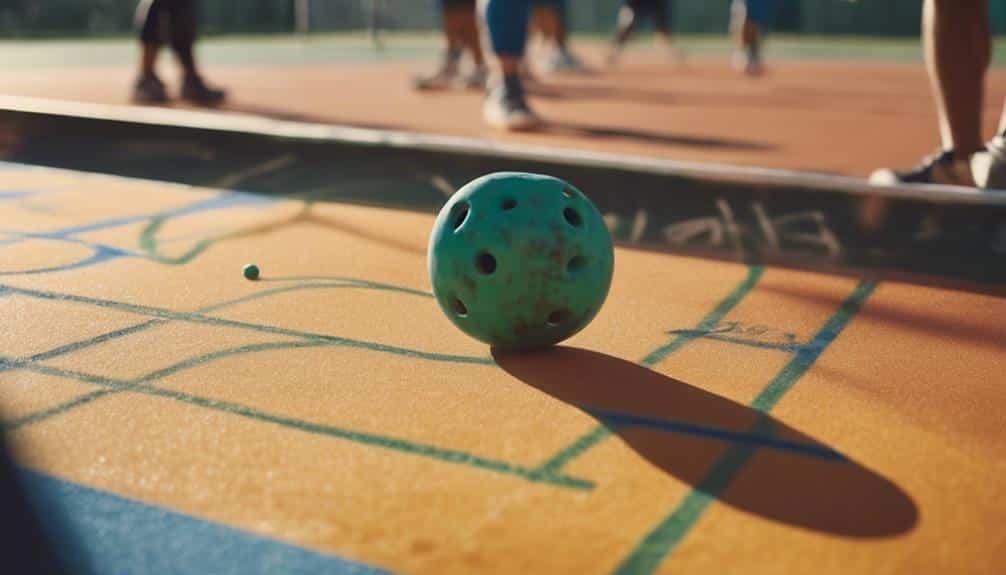
Beyond enhancing emotional intelligence, my regular engagement in pickleball has significantly improved my time management skills, a key component of personal productivity and efficiency.
As I've deepened my pickleball relationships, I've learned to prioritize activities, balancing court time with other responsibilities, optimize practice sessions for maximum skill development, and schedule matches efficiently, respecting others' time commitments.
This heightened awareness of time management has permeated other aspects of my life, enhancing my overall productivity.
The structured nature of pickleball games, with their defined durations and intervals, has trained my internal clock to better estimate time passage.
Moreover, the addictive nature of pickleball has necessitated a disciplined approach to time allocation, ensuring that my passion for the sport doesn't overshadow other essential life activities.
This newfound temporal acuity has proven invaluable in both professional and personal spheres.
Cross-Generational Bonding
Cross-generational relationships, a remarkable byproduct of pickleball participation, have emerged as a significant social benefit of the sport.
I've observed that pickleball's inclusive nature fosters connections between players of diverse age groups, creating a unique sport identity.
This intergenerational interaction stimulates cognitive function in older adults while providing younger players with valuable life experiences and wisdom.
The shared experience of learning and competing in pickleball bridges age gaps, promoting empathy and understanding across generations.
I've noted that these pickleball relationships often extend beyond the court, strengthening community bonds and reducing age-related stereotypes.
The sport's accessibility allows grandparents to actively engage with grandchildren, reinforcing family ties.
Furthermore, the mixed-age environment encourages mutual respect and collaboration, enhancing social cohesion.
This cross-generational bonding through pickleball contributes to a more inclusive and connected society, fostering a sense of belonging for all participants.
Lifelong Learning Opportunities
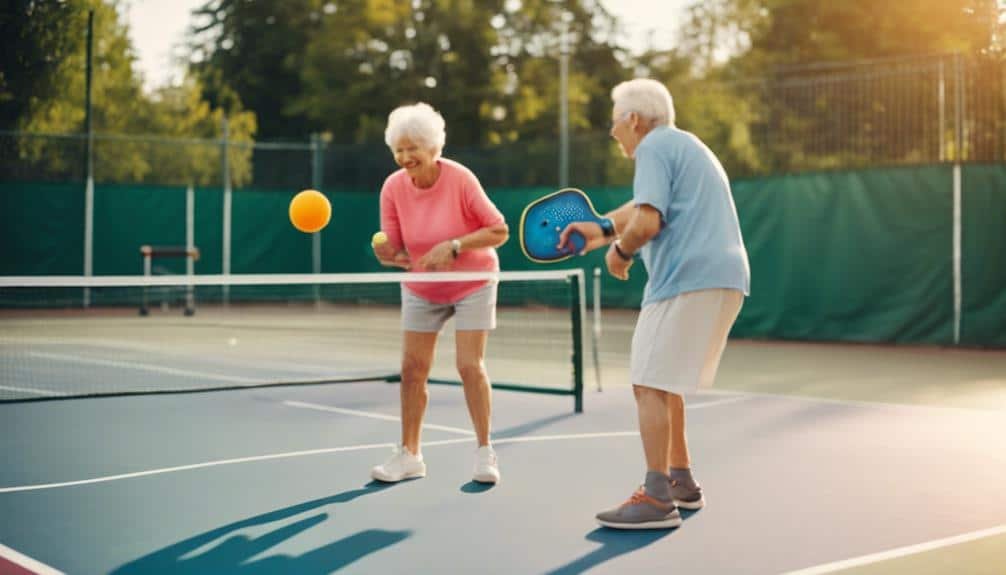
Engagement in pickleball provides a rich landscape for continuous skill development and knowledge acquisition throughout one's lifespan.
As I've observed in my pickleball relationships and therapy sessions, this sport offers unique opportunities for lifelong learning. The neuroplasticity of the brain allows for ongoing adaptation and growth, even in older adults.
Three key areas where pickleball fosters cognitive development are:
- Strategic thinking: Analyzing opponents' patterns and adjusting tactics
- Hand-eye coordination: Refining motor skills through repetitive practice
- Social cognition: Enhancing interpersonal skills during doubles play
These learning opportunities contribute to cognitive reserve, potentially delaying age-related decline.
Moreover, the sport's inclusive nature fosters a sense of belonging among players of all ages and skill levels.
Personal Growth and Self-Discovery
While pickleball offers cognitive benefits, it's equally important to recognize its role as a catalyst for personal growth and self-discovery.
As I've delved deeper into pickleball relationships, I've noticed a profound impact on my spiritual connections. The sport has become a mirror, reflecting my strengths and weaknesses both on and off the court.
I've learned to manage stress, regulate emotions, and cultivate mindfulness during intense rallies. This self-awareness has transferred into my daily life, improving my interpersonal relationships and decision-making skills.
Pickleball has challenged me to step out of my comfort zone, fostering resilience and adaptability. Through the camaraderie and competitive spirit, I've discovered hidden aspects of my personality and values.
The sport serves as a unique platform for self-exploration, allowing me to grow holistically while enjoying the physical and social benefits it provides.
Conclusion
I've witnessed pickleball's transformative power firsthand.
Like a well-oiled machine, my body and mind have synchronized through regular play.
Studies show that pickleball can improve cardiovascular health by up to 12% in older adults.
It's not just exercise; it's a full-body tune-up.
From enhanced proprioception to increased neuroplasticity, pickleball offers a holistic approach to health.
The evidence is clear: this sport isn't just fun; it's a scientifically-backed path to optimal physical and cognitive function.

